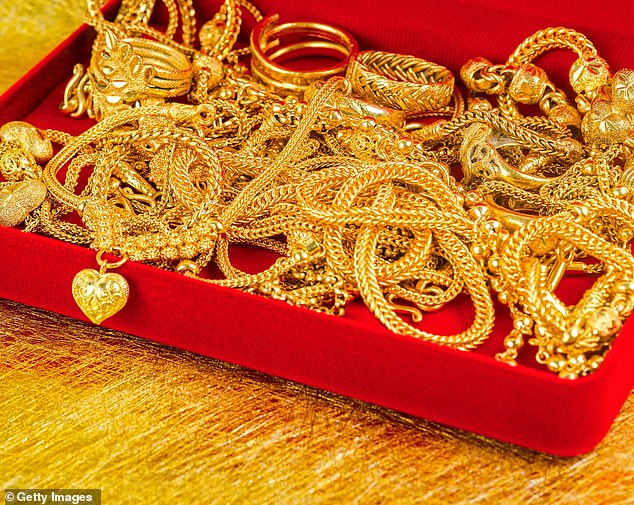[ad_1]
As the price of gold soars, that broken chain or trinket sitting in the back of your drawer or jewellery box could be worth a lot more than you think.
I am a third-generation pawnbroker and have been in the industry for a quarter of a century.
Customers wander into the shop with broken earrings, snapped chains and all sorts of odds, often stuffed into something as unglamorous as a dog-poo bag.
They hand it over with a quiet, ‘I don’t think it’s worth much.’
A few years ago, they may have been right but today – with the price of gold up 32 per cent in a year and 242 per cent in a decade – they get a pleasant surprise.
Last week, a newly divorced woman came into the shop to sell the gifts her husband had given her over the years. She thought she might get £500 at best.

Pleasant surprise: As the price of gold soars, that broken chain or trinket sitting in the back of your drawer or jewellery box could be worth a lot more than you think
When I told her that her little bag of scraps was worth closer to £7,200, her look was priceless. She has booked herself a cruise. It’s astounding how much gold people unknowingly discard. I’ve had customers find gold at car boot sales, charity shops – even in skips.
Of course, you may want to hold on to your gold pieces – and the price could rise further.
But if you’re tempted to cash in on today’s high prices, here’s how can you find out what your items are worth and get the best deal.
First, you can check if your item is real gold using these methods.
- Test it on a magnet. Real gold is not magnetic, so if the item sticks, it’s likely not gold. Be aware, though, some items may contain metal parts, such as clasps, that respond to magnets.
- Scratch test on ceramic: Run the piece across an unglazed ceramic surface (like the underside of a coffee cup). Real gold leaves a gold streak, fakes will often leave a black mark.
- Vinegar test: Place a drop of vinegar on the item. If it tarnishes, it’s likely fake. Gold will not change.
These tests are not definitive but can help determine if an item warrants further examination.
Work out what type you have
All gold in the UK should have a hallmark as these have been legally required since the 14th century. They identify the purity of gold and are essential because different purities yield different values. Here’s a quick guide:
375 (9ct): The most common UK standard, at 37.5 per cent gold.
585 (14ct): Contains 58.5 per cent gold, commonly imported from America and southern Europe.
750 (18ct): 75 per cent gold, used for fine jewellery.
916 (22ct): 91.6 per cent gold, popular in Asian markets.
999 (24ct): Nearly pure gold, typically in bars or coins, known as investment gold.
You may find 8ct gold (from Germany) or 15ct, which used to be recognised in the UK. This is not to say those without hallmarks are not gold as there are places where hallmarking is not required. If you think an item is gold, check it.
What is it worth?
First, find out the current value of gold. An app, such as Kitco, can give up-to-the-minute prices or you can search online. Look for what is called the ‘spot price’, which is for pure 24-carat gold.
To work out the value of your gold, you need to need to apply the percentage of your item that is pure gold to the current spot price. Remember, buyers will deduct a margin for costs.
How to sell it
If you have items such as broken chains, try a reputable pawnbroker or online gold buyer. For diamond and fancy pieces, try high-end jewellers. If you have vintage jewellery, consider platforms such as Etsy. Sometimes gold is worth more than its intrinsic value. For fancier items, it could be worth taking them to an auction house to get a price.
DIY INVESTING PLATFORMS

AJ Bell

AJ Bell
Easy investing and ready-made portfolios

Hargreaves Lansdown

Hargreaves Lansdown
Free fund dealing and investment ideas

interactive investor

interactive investor
Flat-fee investing from £4.99 per month

InvestEngine

InvestEngine
Account and trading fee-free ETF investing
Trading 212
Trading 212
Free share dealing and no account fee
Affiliate links: If you take out a product This is Money may earn a commission. These deals are chosen by our editorial team, as we think they are worth highlighting. This does not affect our editorial independence.
[ad_2]
This article was originally published by a www.dailymail.co.uk . Read the Original article here. .

